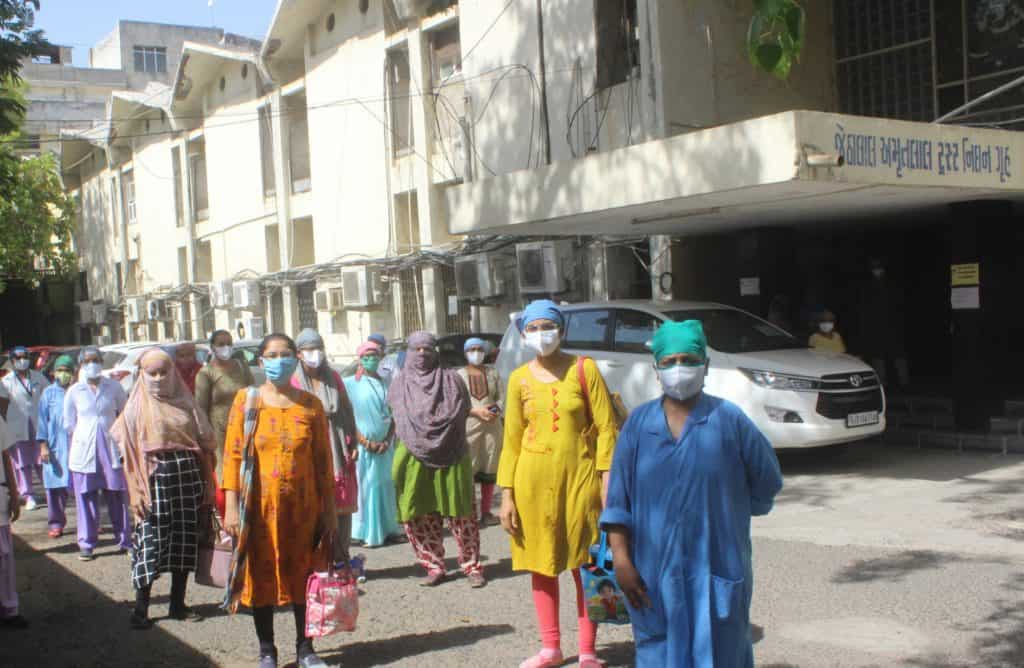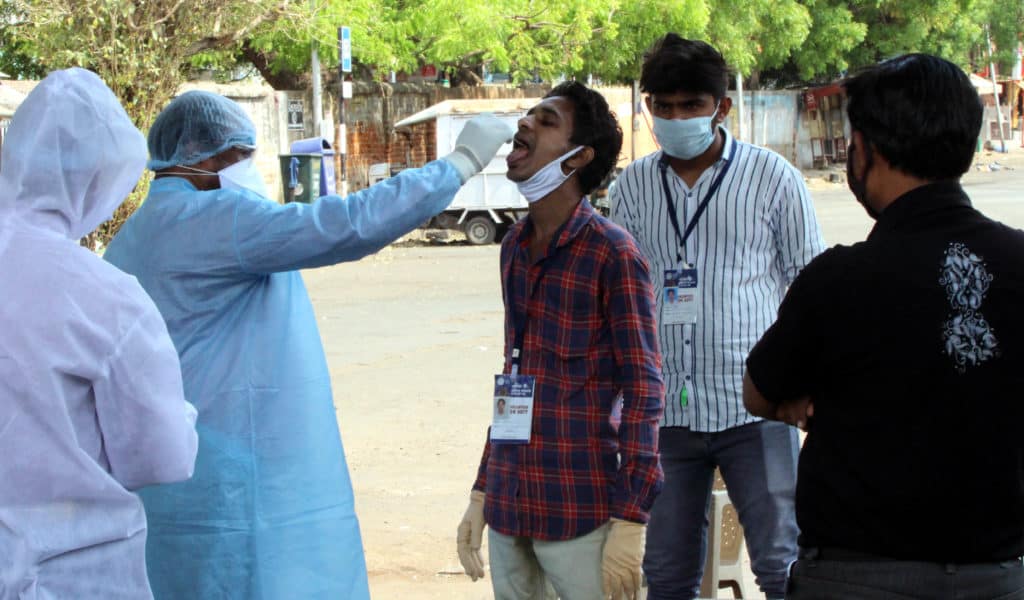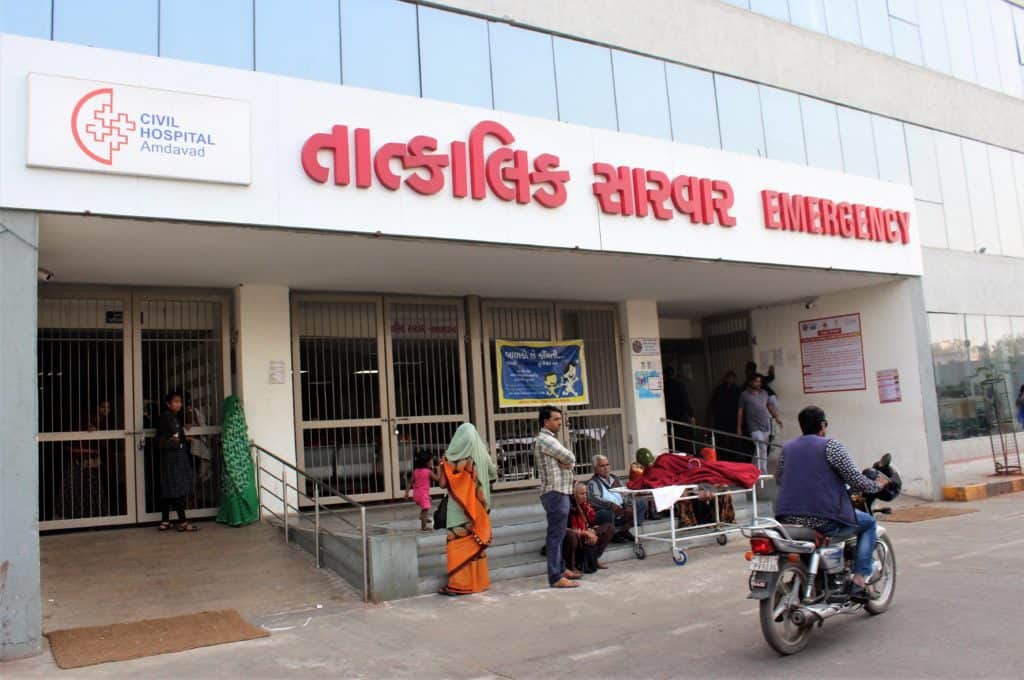The percentage of deaths from COVID-19 in Gujarat is among the highest in the country, even as the number of tests remains among the lowest, government denials to the contrary notwithstanding. Numbers apart, the fact that the state was consistently trying to cut down on testing got some credence, when on May 10th, it made it mandatory for all private hospitals to get government approval before testing patients, admitted for treatment of other ailments, for the coronavirus infection. The Gujarat High Court however rescinded the order on May 29th, in response to a PIL.
Another evidence of the Gujarat government’s alleged attempts to control COVID-19 data came in its own admission in the High Court that “the likelihood of fear psychosis cannot be ruled out if COVID-19 testing is allowed in all asymptomatic cases, just for acquiring a feeling of safety and security.”
The government also took sanctuary in the guidelines by Indian Council of Medical Research (ICMR) and a report of a three-member expert team it had appointed. State Advocate-General Kamal Trivedi submitted an opinion by experts, claiming it to be in sync with ICMR guidelines, that “COVID-19 testing should not be done for asymptomatic individuals, asymptomatic contacts of a positive patient or asymptomatic family of those in quarantine.”
With the government’s continuous citing of ICMR, the High Court has also made it a party in the case.
In the meantime, the HC order on May 29th came as a big relief to countless hospitalised patients in Ahmedabad’s private hospitals, who were not being treated for want of government approval for the COVID test. Since May 10th in particular, the approvals were taking anything from 3 to 7 days, endangering the lives of patients who had serious ailments and needed urgent treatment.
No convincing explanation was given by anyone in the government as to why approvals were taking such a long time, lending more credence to the now general belief that the Gujarat Government was focusing more on managing the numbers, than on screening and tracing COVID patients.
The one reason the government belatedly gave to the High Court, and that too on being specifically asked by the bench, is that its decision (about controlling testing in private labs) “is in tune with the prevalent policy of the ICMR and that it has no relevance or connection with the so-called artificial control of data regarding the number of cases in the State.”

How things changed
As it is, it was only on May 1st, after several representations from the Ahmedabad Medical Association and the Ahmedabad Hospitals and Nursing Homes Association that the Gujarat Government allowed private hospitals to conduct the tests.
According to Dr Bharat Gadhavi of the HCG Hospitals, his hospitals must have taken “40 to 45 patients needing tests” between May 1st and 10th, but after May 10th, “the number of admissions came down to five to seven.” Approval for the tests took less than a day during the period above, which changed abruptly from May 10.
The order for compulsory government approval came simultaneously with the state’s drastic reduction of the number of tests, while the number of patients being discharged showed a significant rise. However, the government insists it is testing “3,000 to 5,000 cases per million which is double the national average of 2,200.” It is another matter that states like Tamil Nadu and Maharashtra were testing more than 10,000 persons every day.

Health department officials maintained that according to new ICMR guidelines, they were testing only suspected or symptomatic cases and stepping up testing only in areas where fresh cases were emerging.
Endangering patients’ lives
Whatever the government’s arguments, there are many examples of patients whose lives were endangered by the delay in getting approval. Like Vijay Mewani, 29, who was admitted to a private hospital in Ahmedabad on May 21st for a renal issue that he had developed as an adverse effect of a medicine. No required surgery or treatment could be done without a COVID test and the hospital, like all other private facilities, was also abruptly told not to conduct it without the government’s approval.
“After repeated emails and calls from our hospital, the government finally gave an approval after four days on May 25 evening,” said Vijay’s wife Sonali. “After that it took more than 24 hours for the test reports to come — thank god it was negative. But till then, my husband remained in the general ward. His case was negative, but what if any of the others around him were positive?”
Sonali’s story is not unique or isolated. Thousands of other patients in Ahmedabad and other cities faced a similar situation, because of the delay in government approvals for the tests. “In a majority of the cases, the approvals did not come,” a senior surgeon in a reputed private hospital said, requesting anonymity.

Octogenarian Rajnikant Patel, admitted in the HCG Hospital in Ahmedabad, for a hip displacement surgery after he had a fall in his home had to wait five days for the approval delaying the surgery he urgently needed. Doctors attending on Vijay Mewani and Rajnikant Patel said such delays could threaten somebody’s life.
And deaths have occurred because of the delay. Take the case of Shantaben Shah, 92, who complained of breathlessness on May 21st. After much difficulty her family got her admitted in a private hospital on May 23rd and she was put on oxygen support. Five days later, Shantaben died, still awaiting government approval for her COVID test. She has not been counted among Ahmedabad’s coronavirus deaths since the test was never conducted.
Similarly — and simultaneously — her 62-year-old son Vijaybhai was admitted in another private hospital with COVID like symptoms and had to wait a week to get government approval for the virus test.
Circumventing HC order
Significantly, three days after the high court directed that no approvals were required for pre-surgery Covid tests once the surgery has been recommended by the patient’s doctor, on June 2nd, the State Health Department issued a directive that rattled private clinics again. The new order said that every person undergoing a COVID-test must be hospitalised.
Reacting angrily to this, the Ahmedabad Medical Association has dashed off a strong letter to the Principal Secretary (Health) Jayanti Ravi, stating that this goes against the grain of the High Court order. Dr Mona Desai, President of the AMA, wrote: “The plain reading of the HC order would make it evident that there is no direction requiring the physician prescribing a COVID-19 test to hospitalise/admit the patient in respect of whom such a test is prescribed.”
Significantly, the letter added that the guidelines of both the ICMR or the Centre leave the decision to the treating doctor.
Meanwhile, with Ahmedabad’s 1,200-bed COVID-designated Civil Hospital reporting a majority of deaths, many non-COVID patients have started avoiding going to the Civil Hospital out of fear since several doctors treating corona patients were doubling up in general wards too. Now, even private hospitals are reluctant to admit any patients.
A strongly-worded letter by the Ahmedabad Hospitals and Nursing Homes Association on May 23rd to State Principal Secretary (Health) Jayanti Ravi demanded to know the reasons for restricting testing. The letter, signed by Association President Dr Bharat Gadhavi, vice-president Dr Anish Chandarana and secretary Dr Viren Shah, also warned: “Please note that we will be forced to stop all COVID admissions at COVID hospitals and divert all of them to the Government hospitals, if this is not taken seriously.”
Private hospitals have also demanded a “very liberal testing policy without requirement of government approval”, pointing out that “adequate US FDA approved testing kits are available,” and the government has already capped the rates at Rs 4,000 for COVID testing by private labs.